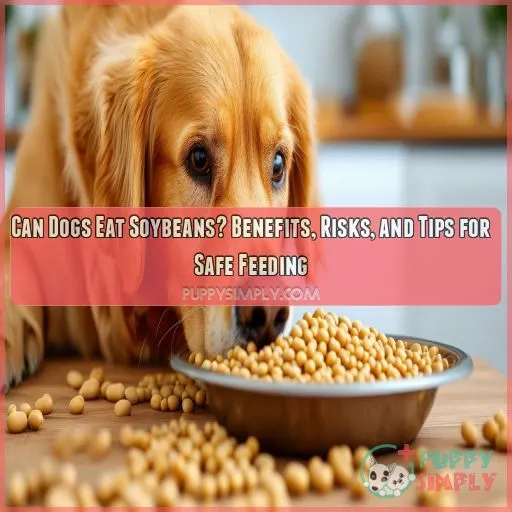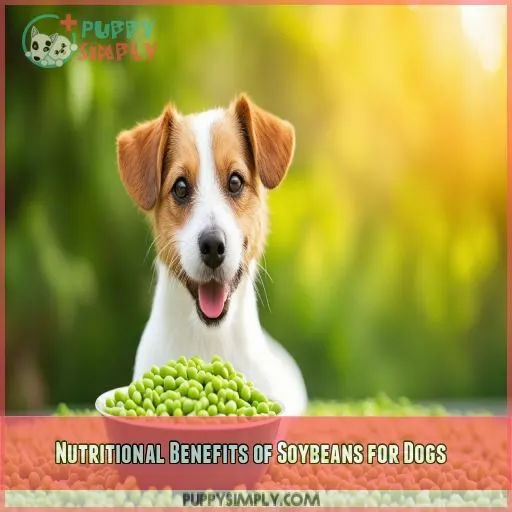This site is supported by our readers. We may earn a commission, at no cost to you, if you purchase through links.

The quick and easy answer would be ‘yes,’ but with some mitigating circumstances.
Soybeans have inherent nutritional benefits, like protein, essential amino acids, and omega fatty acids. They also come with hazards such as allergies and stomach problems.
This guide will help to better understand the benefits and risks, and provide tips for safely adding soybeans into a dog’s diet
Table Of Contents
- Key Takeaways
- Can Dogs Eat Soybeans?
- Nutritional Benefits of Soybeans for Dogs
- Potential Health Risks of Soybeans for Dogs
- Proper Preparation and Serving Sizes
- Introducing Soybeans to a Dog’s Diet
- Soybean Alternatives for Dogs
- Frequently Asked Questions (FAQs)
- Are soybeans safe for dogs?
- Is it okay for a dog to eat edamame?
- How does soy affect dogs?
- Is soybean oil safe for dogs to eat?
- Can dogs eat soy beans?
- Is it good to feed soyabeans to babies?
- Can dogs eat soy?
- Are soybeans poisonous to dogs?
- Can soybeans cause allergies in dogs?
- Are soybean pods safe for dogs?
- How often can dogs eat soybeans?
- What should I do if my dog eats too many soybeans?
- Can soybeans be mixed with other dog foods?
- Conclusion
Key Takeaways
- Dogs can eat soybeans in moderation and can benefit from the essential amino acids, protein, and fatty acids found in soybeans. However, it’s important to introduce them gradually and watch for any allergic reactions or digestive issues.
- Soybeans can offer nutritional benefits for dogs, such as supporting muscle development, promoting skin and coat health, and providing essential vitamins and minerals. However, they also come with potential health risks, including allergies, digestive issues, and hormonal imbalances if consumed in large amounts.
- When incorporating soybeans into a dog’s diet, it’s crucial to cook them thoroughly, remove pods and hulls to prevent choking hazards, and follow recommended portion sizes based on the dog’s weight to avoid overconsumption and possible digestive issues.
- Consulting a veterinarian before adding soybeans to a dog’s diet is essential to ensure that the food is safe for them, won’t cause any health problems, and to receive accurate advice on dietary recommendations relevant to the specific dog concerned
Can Dogs Eat Soybeans?
Yes, soybeans are safe to be consumed by dogs if prepared suitably. Soybeans are rich in essential amino acids necessary for properly developing and maintaining muscles. They are said to have a good amount of fatty acids—Omega-3 and Omega-6—for a shiny coat, healthy skin, and joints.
In addition, soybean offers essential vitamins and minerals like Vitamin K, calcium, and B. However, introduce it gradually and watch out for any allergy or stomach upset. Always cook soybeans properly, removing the pods and hulls.
Consult with your veterinarian before making any changes to your dog’s diet. Stay with us to find out the best method to feed soybeans to dogs
Nutritional Benefits of Soybeans for Dogs
Soybeans are rich in essential amino acids, making them a great protein source for dogs. They also provide Omega-3 and Omega-6 fatty acids, vitamins, and minerals that support overall health
Essential Amino Acids
Soybeans contain essential amino acids that are very important in dog nutrition. Building blocks like these will sustain the growth and maintenance of muscles and muscles in general.
They have some health benefits when added to their diet from time to time as supplements since they are anti-inflammatory in nature. Adequate edamame cooking ensures your dog gets to snack on such nutritious treats without a problem
Protein Content
Soybeans offer a complete protein profile, providing your canine companion with the essential amino acids needed for muscle development and repair. As carnivores, dogs thrive on protein-rich diets to support their energy levels and overall health. Incorporate soybeans as a nutrient-rich protein source in moderation
Omega-3 and Omega-6 Fatty Acids
Soybeans are rich in essential fatty acids like Omega-3 and Omega-6, promoting skin health and a glossy coat in dogs. These fatty acids offer anti-inflammatory benefits, aiding in joint health and reducing the risk of certain diseases. Can dogs eat soybeans? Yes, with fiber benefits and proper moderation
Vitamins and Minerals
Vitamins and minerals in soybeans, like edamame, bolster your dog’s health. Rich in Vitamin K, they aid in blood clotting and bone health. Calcium levels and nutrient ratios found in raw soybeans help prevent mineral deficiency, while antioxidant sources fight free radicals, promoting overall dog nutrition
Potential Health Risks of Soybeans for Dogs
While soybeans can be nutritious for dogs, they also come with potential health risks. These include soy allergies, digestive issues, and possible hormonal imbalances if consumed in large amounts
Soy Allergies
Soy allergies will offset the neurological and hormonal balance in your dog—meaning they’ll itch, develop ear infections, or even lose their coat in the hairiest of places. Testing is achieved through the gradual introduction of soybeans and monitoring reactions. Since environmental factors play into it—along with breed sensitivities—you would want to consult with your vet in testing for allergies. Traditionally, treatment consists of simply ruling soy out of their diet. Ensuring that symptoms are monitored constantly allows your dog’s brain development and overall health to stay on course—that is, remaining balanced nutritionally and stomach-wise.
Digestive Issues
Feeding your dog soybeans, if not done correctly can lead to stomach upset. Stomach sensitivities can lead to gas, diarrhea, or stomach upset, more so with the levels of fiber that are high.
Excessive licking could very well occur, as well as vomiting or problems in bowel regulation. Be sure that soybeans are plain and well-cooked to help enzymes activate and not create an issue in the stomach.
Always introduce gradually to avoid digestive complications and monitor any adverse reactions
Hormonal Imbalances
Feeding soybeans to your dog can lead to hormonal imbalances due to their potential endocrine disruption effects. Soybeans might cause hormone fluctuations and mimic estrogen, affecting thyroid function and increasing the risk of metabolic syndrome.
- Watch for symptoms like hair loss and tired energy.
- Monitor skin pigmentation changes and joint building issues.
- Pay attention to how red blood cells and overall thyroid function are impacted
Proper Preparation and Serving Sizes
To safely prepare soybeans for your dog, cook them thoroughly and remove all pods and hulls to prevent choking hazards. Follow recommended portion sizes based on your dog’s weight to avoid overconsumption and possible digestive issues
Cooking Soybeans
Cooking soybeans for your dog is pretty simple. Just boil or steam the beans without adding salt or seasonings.
You can use fresh or frozen soybeans. Once they’re tender, drain and rinse well. Avoid pods as they’re hard to digest.
Mix cooked beans in with the meals or as individual treats—possible portions adjusted for different breeds and sizes of dogs
Removing Pods and Hulls
You can safely feed soybeans to your dog only when the pods and hulls have been removed. They constitute a choking hazard and will obstruct digestion. Here’s how you do it:
- Shell soybeans, making sure to remove all pods.
- Rinse beans under cool water to make sure they’re clean.
- Check for remains of hull pieces to ensure proper digestion of the food without any problem.
This process ensures you maximize nutritional value and minimize risks
Recommended Portion Sizes
When feeding soybeans to your dog, one has to be very careful with the portions to avoid overfeeding risks and prevent obesity concerns.
Extra-small dogs will have 1 tablespoon.
Small dogs—21-30 pounds—can take up to 2 tablespoons, while medium dogs—31-50 pounds—take three tablespoons.
Larger dogs require no more than 4 to 5 tablespoons.
Always observe feeding guidelines to ensure healthy calorie management
Introducing Soybeans to a Dog’s Diet
Begin by feeding small amounts of soybeans to your dog and see if there are any adverse reactions. Always consult with your veterinarian before adding anything to your pet’s diet to ensure that the food is safe for them and won’t cause any health problems.
Gradual Transition
In the case of soybean introduction into the dog’s diet, start with a gradual transitory phase to reduce any digestive discomfort and develop tolerance. This is how you do it:
- Start Small: Give a little and watch for dietary changes.
- Increase Slowly: increase the dose over one to two weeks.
- Monitoring Frequency: Begin by feeding once per week.
- Use: Make use of them as training treats seasonal treats, and digestive aids.
Monitoring for Reactions
After introducing soybean into your dog’s diet, watch for allergic reactions, such as itching or problems with their coat.
Watch your dog for gastrointestinal issues like vomiting or diarrhea.
Notice the possibility of endocrine disruption, whereby hormonal misbalances may occur in your dog’s system.
Observe for nutritional deficiency and unusual fatigue.
If such conditions remain unchecked, they could further increase the chances of cancer risk.
Be ever vigilant to ensure soybean is good for your dog’s health
Consulting a Veterinarian
Always consult a veterinarian before administering soybeans to dogs. The vet can provide an accurate diagnosis regarding the health status, presence of allergies, and dietary recommendations relevant to the dog concerned.
They’ll let you know if there are allergies or digestion issues and help with nutritional suggestions to ensure soybeans are safe for addition to their diet.
Always seek the advice of your vet to keep your furry friend healthy and happy
Soybean Alternatives for Dogs
If soybeans aren’t suitable for your dog, consider other legumes like lentils and chickpeas, which provide similar nutritional benefits. Alternatively, lean protein sources like chicken, turkey, and fish or balanced commercial dog food can meet your dog’s dietary needs
Other Legumes
While soybeans are a safe and nutritious option for dogs, other legumes like chickpeas, lentils, and peas have been under scrutiny for their potential link to heart disease in dogs. The FDA has investigated the correlation between grain-free dog food containing legumes and dilated cardiomyopathy (DCM).
However, in moderation, these legumes offer benefits. Chickpeas are a good source of fiber and protein, and lentils provide iron, fiber, and protein. Peas are packed with antioxidants, supporting skin, heart, and eye health
Lean Protein Sources
Lean meats are a great alternative to soybeans, offering a range of health benefits for your dog. Chicken breast, lean ground beef, and whitefish are excellent sources of lean protein, packed with vitamins, minerals, and amino acids. These options promote healthy weight management, boost the immune system, and support muscle repair.
If your dog has allergies or frequent stomach issues, lean pork or lamb could be a good choice. These meats provide essential amino acids and healthy fats, such as omega-3s, which promote healthy skin and coat.
When selecting lean meats, opt for fresh, natural, or human-grade options. You can cook these at home or choose a subscription plan that offers customized, nutritious meals for your dog’s specific needs
Balanced Commercial Dog Food
If you’ve considered soybeans but worry about allergies or digestive issues, balanced commercial dog food is a great alternative. These foods often offer superior nutritional balance, cost comparison, and longer shelf life.
They come in various formulas to fit your dog’s needs, including organic options. You’ll avoid availability issues and provide consistent, safe nutrition with potential variations suited to breed, size, and age
Frequently Asked Questions (FAQs)
Are soybeans safe for dogs?
Yes, dogs can safely eat soy beans in moderation. They provide beneficial nutrients like protein and omega-3s. But introduce them slowly and watch for any allergic reactions. Always consult your vet before adding new foods to your dog’s diet
Is it okay for a dog to eat edamame?
Yes, dogs can eat edamame. It’s safe if fed plain, and you follow moderation. Always remove the pods and start with small amounts to test for allergies. Avoid any added spices, salt, or seasonings
How does soy affect dogs?
Did you know dogs can develop soy allergies? While soy offers nutrients, feed it sparingly and watch for signs of intolerance like itching or diarrhea. Consult your vet before adding soy to your pup’s diet
Is soybean oil safe for dogs to eat?
Yes, dogs can consume soybean oil, but only in small amounts. It’s a good source of omega-3 and omega-6 fatty acids, but overuse can lead to obesity and digestive issues. Always consult your vet first
Can dogs eat soy beans?
Yes, they can. However, moderation and precautions are of the essence. Ensure that they’re well-cooked soybeans, plain, and a small amount since excess intake may lead to stomach upset or allergic reactions in some dogs.
Is it good to feed soyabeans to babies?
Forewarned is forearmed. It’s advised to avoid feeding soybeans to babies as they can cause allergic reactions and digestive issues. Instead, focus on introducing age-appropriate, nutrient-rich foods for their developing systems
Can dogs eat soy?
Yes, they can. However, introduce the soy to your dog slowly because of possible allergies. Ensure that it’s plain and cooked and given in moderation without seasonings. Consult your vet if your dog has some kind of dietary restriction or if you just want to be on the safe side.
Are soybeans poisonous to dogs?
No, soybeans aren’t poisonous to dogs, but feed them in moderation. They offer nutritional benefits but can cause allergic reactions or digestive issues. Always serve cooked, plain soybeans to avoid harmful additives
Can soybeans cause allergies in dogs?
Absolutely, soy can cause allergies in dogs. Typical symptoms include itching, coat loss, ear infections, and even gastrointestinal problems. Introduce them carefully and always observe your dog’s reaction closely to ensure his safety.
Are soybean pods safe for dogs?
No, soybean pods aren’t safe for dogs because they’re a choking hazard, and the dog can’t digest them. Remove the beans from their pod permanently when giving them to your dog for safe consumption.
How often can dogs eat soybeans?
Just like a limited treat, dogs can eat soybeans once or twice a week. Make sure they’re cooked, plain, and served in moderation to avoid any digestive issues or potential allergies. Always consult your vet first
What should I do if my dog eats too many soybeans?
If your dog eats too many soybeans, monitor them for symptoms like vomiting, diarrhea, or bloating. Keep them hydrated and contact your vet immediately for proper guidance and potential treatment options
Can soybeans be mixed with other dog foods?
Absolutely, you can mix soybeans with your dog’s regular food. Just be sure to introduce them slowly and in moderation to avoid digestive issues. Consult your vet for the right portion size based on your pup’s needs
Conclusion
Ensuring your dog’s well-being through diet is essential.
Yes, dogs can eat soybeans, but caution is necessary. While soybeans offer key nutrients like essential amino acids, protein, and fatty acids, they can also trigger allergies and digestive issues. Introduce them gradually, cook them properly, and monitor your dog for any adverse reactions.
Always consult your veterinarian before making dietary changes. Following these guidelines, you can safely add soybeans to your dog’s diet and enhance their nutrition











